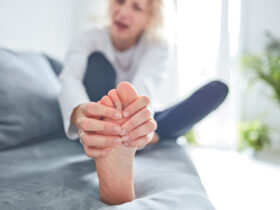 What Is a Balance Disorder?
What Is a Balance Disorder?
Your sense of balance is critically important to help prevent falls and injury.
A balance disorder affects your body’s ability to hold an upright, safe position and is often experienced as dizziness and vertigo. Dizziness is a feeling of being unsteady or having a distorted sense of your body in the space in the space around it. Vertigo involves a sense a movement, as if you or the environment around you is spinning.
Dizziness and vertigo can be accompanied bylightheadedness, blurred vision, confusion, disorientation, nausea, and vomiting. Dizziness and vertigo are symptoms of numerous conditions, including anxiety, dehydration, circulation issues, nervous system and brain conditions, medication side effects, and inner ear disorders.
An ENT can help you determine if your dizziness or vertigo is caused by an inner ear disorder.
Balance and the Inner Ear
Your sense of balance is guided by signals from your eyes, ears, and sensory receptors to your brain.
The part of your ears involved in balance is called the vestibular system, a structure of bone and soft tissue located in your inner ear. Within this structure are loopshaped canals that contain fluid hairlike sensors. When you move your head, the fluid in the vestibular system causes the hairlike sensors to bend, sending a signal to your brain that your head has changed position. With this information, your brain can send signals to other parts of the body, such as your eyes and muscles, to move your body’s position and visual focus to help maintain your sense of balance.
When any part of the vestibular system is injured or malfunctioning, proper signals to your brain can be disrupted, causing you to feel imbalanced. When the vestibular system is the cause of your sense of imbalance, it is called a vestibular disorder.
Common Vestibular Disorders
Autoimmune Inner Ear Disease (AIED)
Autoimmune Inner Ear Disease is caused by a malfunctioning immune system that attacks healthy ear tissue. It affects both ears and causes hearing loss and balance issues. Once symptoms are present, they typically progress quickly. AIED is rare, affecting 15 out of 100,000 people, and is most common in middle-aged women. It commonly occurs with other autoimmune diseases such as rheumatoid arthritis, lupus, scleroderma, and ulcerative colitis.
Acoustic Neuroma
Acoustic neuroma is a benign (non-cancerous) tumor that grows on the nerves in the inner ear that are responsible for hearing and balance. The pressure on the nerve from the tumor may cause hearing loss and imbalance.
Benign Paroxysmal Positional Vertigo (BPPV)
Benign paroxysmal positional vertigo (BPPV) is one of the most common vestibular disorders. The structures in your ear that monitor your head’s movements crystals that make you sensitive to gravity. These crystals can become dislodged for several reasons, such as serious trauma to the head or even minor trauma such as a violent sneeze or bumping your head into something. When the crystals become dislodged, they can move into the canals of the vestibular system and create a fall signal of head movement, causing dizziness. Benign paroxysmal positional vertigo can occur at any age but is most common in people over the age of 50.
Mal de Debarquement Syndrome (MdDS)
Mal de Debarquement Syndrome is a rare condition that causes a severe and often debilitating feeling of swaying or bobbing, much like motion sickness but without motion. It often follows boat or ship travel but can persist for months or longer. While it is a neurological condition rather than a vestibular condition as it does not involve the inner ear, patients often see ENT physicians for a diagnosis.
Ménière’s Disease
Ménière’s disease causes severe vertigo, ringing in the ears, hearing loss, and a feeling of fullness or congestion in the ear. In Ménière’s disease, a buildup of fluid in the inner ear interferes with the vestibular nerve’s ability to send signals that regulate balance to the brain. Ménière’s disease usually affects only one ear but over time can progress to affect both ears.
Vestibular Neuritis
Vestibular neuritis, or vestibular neuronitis, is characterized by inflammation of the vestibular nerve in the inner ear. It causes a sudden case of severe vertigo, dizziness, balance problems, nausea and vomiting that can last for minutes or prolonged over several days. Vestibular neuritis is typically caused by a virus either in the ear or elsewhere in the body.
Perilymph Fistula
A perilymph fistula is a tear or defect in the membrane that separates the air-filled middle ear and the fluid-filled inner ear. This tear allows fluid from the inner ear to flow into the middle ear, causing a change in the ear pressure of the middle ear. This change in ear pressure can stimulate the balance structures in the inner ear. Sudden pressure changes, head trauma, or injury to the ear are common causes.
Diagnosing Vestibular Disorders
The otolaryngologists at Florida Gulf Coast ENT and the audiologists at Florida Gulf Coast Hearing Center are trained to performed diagnostic tests for vestibular function. Tests they may perform include:
. Hearing tests – To evaluate hearing functionality
. Electrocochleography (ECoG) – Measures inner ear fluid pressure
. Electronystagmography (ENG) or Videonystagmography (VNG) — Measures eye movement and the muscles that control them
. Head movement testing – Evaluates the effect of tilting your head
. Rotational chair testing – Measures eye movements while you sit in a computerized chair that moves
. Posturography – Measures your ability to maintain proper posture under different test conditions
. Subjective visual vertical test (SVV) – Measures how your inner ear senses gravity
. Vestibular evoked myogenic potential (VEMP) – Evaluates the functionality of the inner ear and vestibular nerve
. Blood tests – To check for infections
Your otolaryngologist may consult with other physicians such as neurologists to assess neurological conditions, and cardiologists to assess circulatory conditions.
Treating Vestibular Disorders
Your treatment plan will depend on which type of vestibular disorder you have. Options may include:
. Medications to treat an infection
. Medications to prevent vertigo and nausea
. Treatment of underlying conditions
. Surgery to repair inner ear function
. Dietary changes
. Activity changes
. Physical or occupational therapy
Be Safe When Feeling Dizzy
Dizziness and vertigo increase the risk of falling and injuries. To minimize this potential, consider taking these safety precautions:
. Minimize driving
. Minimize going up and down the stairs
. Walk with a cane or walker
. Install “grab bars” in the bathroom
. Wear low-heeled shoes
Price Sonkarley, MD
Specializing in Ear, Nose and Throat Disease, Allergy, Hearing Care and Hearing Aids
Introducing Price Sonkarley, MD, the new owner of Mark Montgomery, MD PA
Dr. Price Sonkarley is a Board Certified Otolaryngologist Head and Neck Surgeon and will be continuing Dr. Montgomery‘s practice providing excellent care to all patients. He will be performing both medical and surgical aspects of the specialty and is accepting new patients.
Dr. Sonkarley grew up in the Midwest and received his Doctorate from the University of Wisconsin School of Medicine. He completed his Otolaryngology Residency at the University of Oklahoma. He served in the US Marine Corps for 5 years and was awarded the Joint Services Achievement Medal after his tour in Iraq.
Kathleen Rocuant, Au.D FAAA received her Doctorate from the Arizona School of Health Sciences and is Board Certified by the American Board of Audiology. She Specializes in Hearing Evaluations Hearing Aids and Hearing Solutions. She is a Fellow American Academy of Audiology and a member of the American Academy of Audiology and the Florida Academy of Audiology.
Do you suffer with a chronic cough? Throat irritation? Hearing loss? Nasal congestion? Ear fullness?
Allergy sufferers, ask us about our alternative solution to allergy shots.
We are always accepting new patients.
Don’t trust something as important as your hearing to just anyone.
Call us and make an appointment today!
Serving all of Southwest Florida
9240 Bonita Beach Rd. SE#1106
Bonita Springs, FL 34135
239.495.6200









